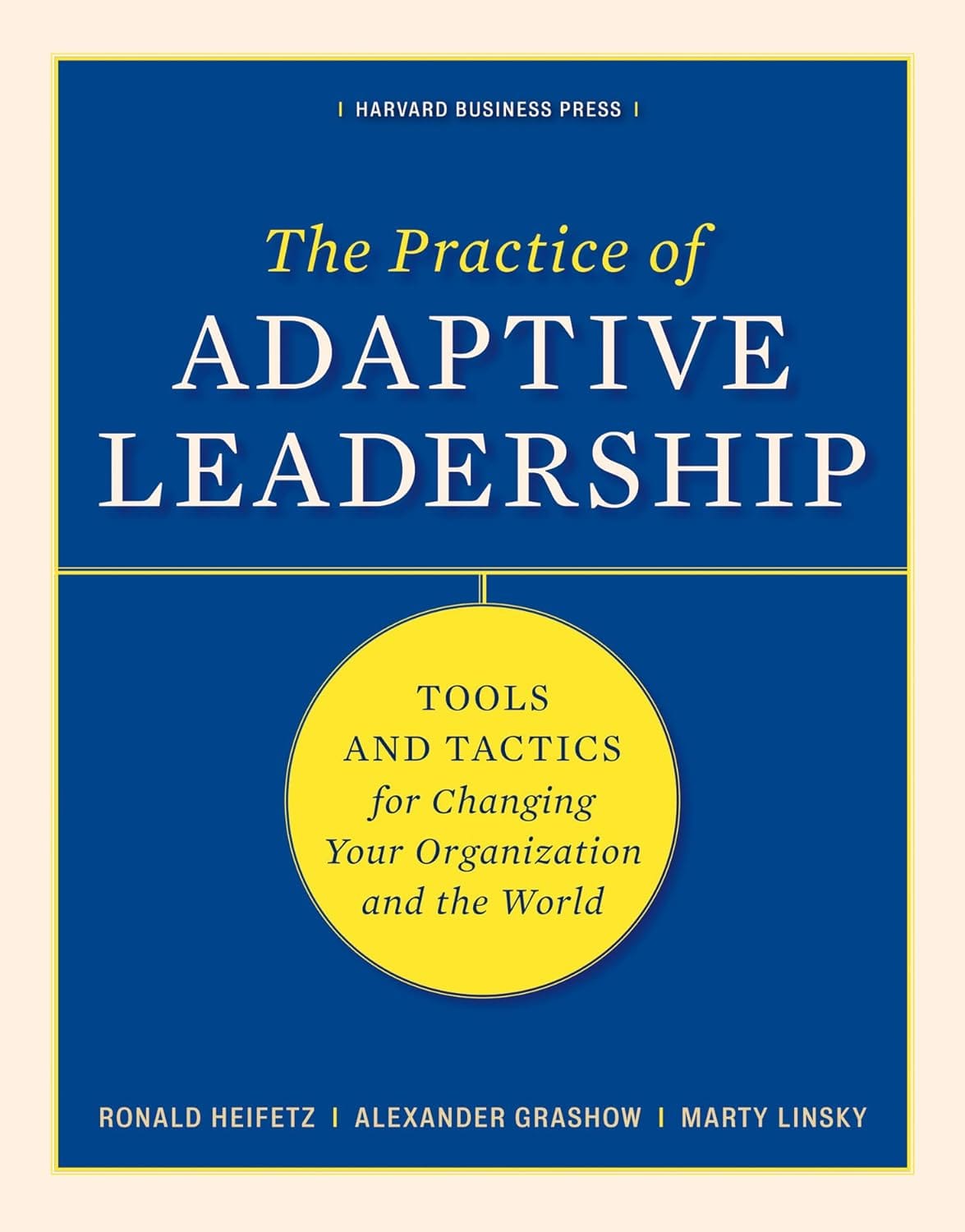Leading teams & lessons learned
"Sometimes it is easy to forget that guiding the behaviors and actions of individual team members is a means to an end. Your job is not simply to lead others, your job is to achieve an outcome. Leading and managing people (two different things) is how you achieve that outcome."

"People do not learn by being told answers. If you're a good leader—a good teacher—you're going to lead them through learning with you, and they are going to get to the answer, and you are going to celebrate them doing it." —Claire Hughes Johnson
Some context and a quick introduction
I was asked recently about my experience in positions of leadership, my approach to leading and growing teams, and what specific tactics I've found work best.
This topic, of course, is huge, and has already been the subject of many books (a select few of which I've recommended below), so my answer could have taken any number of paths from a variety of possible starting points. Where to even begin? Also, what is the context of these questions and what kinds of answers is this person looking for? Are they looking to learn something or judge my competency? Do they want advice?
In the end I gave a simple, honest answer based on my past seven years of experience being in the position of leading a team of direct reports, leading a large multidisciplinary project, or both. It brought us to other topics around working people and personalities, which ultimately was the point. I also talked about specific scenarios I had experienced and how I handled them, rather than a more abstract framework or overarching philosophy. I didn't have a clear set of personal leadership principles and lessons learned over the years to point to because I had never taken the time to write one.
I have now taken the time.
Writing them down helped to clarify certain opinions I hold and bring my own thinking into sharper relief, but my main hope is that it proves even more helpful to you. I put them into my own (hopefully comfortable, non-jargony) words for anyone interested in entering the world of people management and leadership, or interested in growing and improving in this regard.
I'm by no means a leadership expert of course, not by any stretch. But I have learned enough to know that leadership is a discipline—a skill that can be practiced and evolved and refined—and not simply a quality or personality trait, and that improvement comes not just from personal experience but also from putting into practice the personal experience of others to see what works.
What follows is a condensed synthesis of what I've learned works best for me based on what I've tried. It does not get into the weeds of things like calendar management techniques or prioritization criteria, though these are certainly important in their own right. I try to stay focused on maxims for dealing with people, not time.
If you find any of this useful, please let me know! I'd love to hear from you. And feel free to take and adapt and share what you like, as you like.
These are not my ideas. They're ours.
Leading teams & lessons learned
Different people need to be managed differently.
Let's start here.
Part of the reason why large, overarching lessons are hard to pin down in the first place is: people are different.
It's one of those fundamental truths that sounds too trite, too obvious to be useful. But I have personally worked under leaders who took the same approach with each subordinate under the assumption that we all dealt with setbacks like he did, thought about situations the same way, and were motivated by the same things.
The differences between individuals goes far beyond physical characteristics and broad categorizations like introversion vs extroversion. (As an aside: I had always settled on the definition of these terms being a function of where people get their energy—introverts from solitude, and extroverts from social situations. But I recently read an alternative definition that I think is more useful: Introverts think to talk, while extroverts talk to think.)
As someone in a leadership position or as a manger of people, your first order of business is to take time to understand your people.
- Do they appreciate more of your involvement and assistance or are they more comfortable with less frequent check-ins?
- What are they good at, and what do they like doing? (Note: these are not always the same thing!)
- Do they respond better to extrinsic motivation, or intrinsic motivation?
- Do they prefer to communicate via chat apps, email, or in-person conversations? Are they more verbal or more written in their thinking and expressiveness?
- Do they tend to ask for work and proactively reach out, or are they more passive and default to receiving tasks and projects?
- What annoys them? What bothers them? What frustrates them?
- What can you learn from them? What might they have to teach you?
It's helpful to think of people not as being this way or that way—a binary, yes or no approach—but as being more or less a certain way, which instead plots different attributes on a spectrum. Spectrum thinking in general is often a great way to shake up conventional modes of understanding to make forward progress, since it relieves you of the struggle to fit things neatly into compartmentalized boxes.
Try to interact with each person on a case by case basis, and use what you know about them in how you communicate with them.
This isn't just about politeness or empathy. You will get better results from people when they see that you took the time to care about their distinctions.
The objective is not desired behavior but a desired result.
Sometimes it is easy to forget that guiding the behaviors and actions of individual team members is a means to an end. Your job is not simply to lead others, your job is to achieve an outcome. Leading and managing people (two different things) is how you achieve that outcome.
Software developers, for example, make things happen through code. You are in the business of making things happen through other people, which in my opinion is more challenging. But both are about efficiency and leverage, and in both cases success is best achieved by stating clear instructions.
Practically speaking, and for our purposes here: it is very helpful to write things down and state clearly all the unspoken expectations, needs, wants, procedures, and best practices you have in your head so that others can see them. I have been shocked at how often this is not done.
What is our objective? How will we know when we have reached it? What happens if we fail to reach our objective? What is the criteria for judgment? What is expected? What comes after?
What did we not know, and what did we learn? What did I learn? What did I think would be easier than it was?
At one particular organization I was able to deliver plenty of value not by inventing a new way of doing something but simply by documenting the way something was already being done. By just writing down ephemeral (but valuable!) thoughts and rationale that team members take for granted you can make them more real. These maxims or procedures then exist in the world, can be pointed at and talked about more directly. There are also loads of time-saving efficiencies that compound over time related to team member onboarding and growth planning, since all the if-then statements have already been captured.
(This article is an example of me taking my own advice.)
Take responsibility, not credit.
I once had a team member give a presentation to a senior client that was largely a collaboration between me and him, and included more than a few late nights of refinement and proofing on my part. In the end it was important that he got full credit for what was a well-received and well-handled meeting.
There was one important piece of client feedback that was asked in the room however, and it had to do with a key consideration that we hadn't accounted for. I jumped in and admitted that it was my miss—something I had deliberately chosen to ignore for the purposes of the presentation. (This was true)
The important thing is that my team member got valuable experience and grew the client's confidence in his ability to be trusted with presentations. If anything was wrong with the result then that is feedback for me, as the overall output of the team is my responsibility regardless of which individual contributor did the work or presenting. The buck has to stop somewhere. That's the gig.
If there is critical feedback I do have to give to direct reports, I deliver it during the next one-on-one or on the trip home.
"Praise in public, critique in private" is a rule I live by and has served me well.
Good communication is mostly about listening, not talking.
I studied music formally a long time ago, and it was during that time that I learned that listening is a skill, and that most people (myself included, at the time) are not very good at it. Most people rather than listening are just waiting to talk, having something in the wings they want to get out. It takes practice to overcome this habit (which, to be fair, often arises out of a desire to be relatable and a good conversationalist), but it can be done.
Most people when they think about communication think of it as talking, and so being a good communicator to them means being clear and concise and eliminating ambiguity. And this is a great start.
But communication is a two-way affair. A dialogue, not a monologue. Whatever it is you have to say will be made better by whatever information you're able to receive before you say it. This is the nature of information in generally, but add to this a more human-centric and emotional fact: all people want is to be heard and to be listened to. And to be heard and listened to is sometimes the hardest thing for us to get.
The leaders I most admire are not big talkers. When they do have something to say it carries a bit more more weight, in part because it's not as frequent. It isn't as frequent because as a general rule they spend far more time actively listening to others instead. They listen for new data, subtle nuances, implied meanings, and an array of other helpful—sometimes crucial—information swirling around a room. And they can expertly parse it to separate signal from noise.
Most people busy themselves with responding to noise under the pretense that it's better to be seen doing something rather than nothing. Instead, try to secure the signal first. Then whatever you have to say will be more likely to actually help the situation.
This is good communication.
Providing context can turn an "I" into a "We." Explain why you're asking for something.
In a leadership role, stating clear expectations with others—especially direct reports or more junior colleagues—is important. However, as advice I've found that it's a bit too broad and general to be useful.
Instead, think of setting expectations more as a meeting you're inviting your team into. Rather than saying, "this is what I expect of you" or, "here's what I expect to see," try: "Let me show you the situation I'm dealing with so you have some context." Here's why:
- First of all, you're sharing. This is much better than hiding your own tasks and responsibilities under some need-to-know policy. Sharing demonstrates trust and respect.
- Second of all, you're giving them the 'why.' All too often I've been given orders to perform a task without any understanding of why I'm doing it or what it's for. Knowing why something is needed and when goes a long way in making sure what's delivered has been properly considered and not simply "done."
- Most importantly, you're shifting into We mode. "We need to achieve something together, so let's decide how best to divide and conquer." Within this framing you can still delegate and provide clear direction (which is still your responsibility), but it creates space for discussion around timelines and workload that feels more like a collaboration than pushback.
When I delegate a task I almost always follow the request with the phrase, "Here's why I'm asking:"
I like to treat my direct reports as my peers, with the same level of respect and courtesy as a senior executive. Don't get me wrong, organizational hierarchies and positions exist for a very good reason, even within so-called "flat" organizations. But there is a difference between managing someone and treating them as somehow "beneath" you.
In high school I had a varsity soccer coach who would dole out punishment after a bad loss by making the whole team run a grueling 3-mile lap around the school grounds, up and down hills and through the forest along the way. It was called "The Tour" and it was the worst. But what I remember most isn't the exhaustion, it's the fact that the coach would run it with us—usually up at the front, too. To me, that always been my prototype for leadership. Leading by example puts you in the We mode.
Remember that you may be a leader in a given situation, but the thing you're leading is a team. You're in this together, working together. The language we use shapes our thinking in subtle ways that only become apparent later if at all.
Simply using the right pronoun more often—"we"—can make all the difference.
Sometimes you're not the leader.
The status of leader and the nature of leadership, to me, depends greatly on what the situation needs.
The best leaders I know have this uncanny ability to sense when they are not the leader, and can adjust their approach seemingly detached from notions of ego or pride.
Sometimes it's with silence, laying back while another team member leads a section of an important pitch.
Sometimes it's with participation, contributing alongside junior group members in a customer journey workshop or initiative prioritization exercise. (This usually works best when submissions are anonymized)
Sometimes you need to jump in and get hands on. Chefs understand this. Despite their role as the literal "boss" of the kitchen, they can and will step in quickly if a sous chef starts dropping the ball. It then becomes a great opportunity to demonstrate why they're the boss—proof that they, too, have been in the trenches before.
The point is: understand that sometimes, in certain situations, your role as leader will shift. This is not an endorsement of micromanagement. Think of it more as embedded management.
Don't let your title get in the way of the outcome you're responsible for delivering. Learn to recognize when a situation already has an effective leader and when it doesn't.
1:1 meetings are vital and deserve respect.
Despite my opinion of them a couple decades ago, it turns out 1:1 meetings are very important and should not be considered optional or done on an "as needed" basis. Discuss and decide on a cadence with each team member, schedule them, prioritize them, and arrive with at least a couple topics prepared.
When it comes to 1:1 meetings themselves, I like to frame discussion and feedback in terms of a question to be answered rather than direction to be followed.
For example, instead of saying something like, "I've noticed that you've been doing such and such and I have some suggestions," I've had more success phrasing it this way, which I learned after hearing someone else: "I suspect such and such is happening based on a few things I've heard and noticed. First of all, what do you think of my interpretation? Does that seem fair/accurate, or are there other factors I'm missing?"
I like to starting both positive and challenging conversations from a position of inquiry. Something to be figured out. Why did this work, or why isn't this working?
This is all well and good when there is feedback to give or problems to solve. But what about when things are going well and a team member is crushing it?
Don't neglect the rockstars.
There is always a temptation, if not an unconscious habit, to ignore those who don't need our attention. But, in my own opinion and definitely from a company standpoint, it is precisely those who are already executing well and achieving the best results who deserve our attention the most.
It's been frequently pointed out that it's far more expensive (in both time & money) to hire a new employee than retain an existing one, and top performers often resign first. It's one of the lesser appreciated challenges of team management.
On most days I see my job as one of support and friction removal, but also advocacy. I want to make my team's life easier and help where I can, but I also want to help them advance and grow. I want them to improve in their abilities but also in their overall positions and responsibilities.
I once told a direct report of mine that it was my job to get her to the point where she could take my job. And I meant it. We should all be trying to put ourselves out of work by up-skilling and up-confidencing the inexperienced but promising, while up-skilling and up-confidencing ourselves along the way. (A few years ago I found out that in 1896 there was something called the National Association of Black Women’s Clubs, and their slogan was “Lifting As We Climb.” It quickly became my own slogan too.)
I think a healthy company should resemble the circulatory system of a healthy body, something constantly changing and flowing to be re-oxygenated and made more effective. I do not mean everyone should always be promoted (The Peter Principle is a real thing), it means everyone should be learning and growing.
Those who don't seem to need micro help (tasks, responsibilities, processes) could almost always use macro help (life, career, trajectory).
Most people are mostly there already. They might just need confidence.
This principle largely has to do with coaching and mentoring.
It is a reminder that if people ask you for guidance or advice, your first order of business isn't to tell them what to do or how to do it.
Instead, ask them where they're stuck and why. Ask more questions, probe into their working solutions and ideas. You'll often find that they are either on the right track or largely have their problem figured out already but are doubting themselves.
I mean, fair enough. Doubt is an indication people recognize their own ability to make mistakes, and that they are asking for help at all is a sign of maturity and humility. They may even know they're in a good place but just want a second opinion from someone with more experience.
Don't assume what people need is the solution. They may already have the solution and what they need is reassurance.
After passing that filter then yes, you may then need to provide direction or suggestions to help this person overcome a hurdle or choose a path forward. Still, I would bet that they are most likely most of the way there. They might just want someone to help them stick the landing.
It starts with you.
I'm ending with this principle rather than starting with it because it's perhaps the most important, and I want it to be better remembered.
There's a Robert Greene quote from his book The Laws of Human Nature that has always stuck with me: "By understanding the permeability of emotions you will learn that the most effective means of influence is to alter your moods and attitude."
Read that again. It's a good reminder that you are in control of much more about yourself than you think you are.
I've read many different definitions of "leadership" over the years, all largely true to some extent but usually used to make some point or another. We all have opinions about what makes a good leader, or how a good manager differs from a great one, but I've noticed they tend to tell you more about the person than they do about leadership itself.
As for me, I value the truth very highly in my life, and I really don't like hypocrisy. "Do as I say, not as I do" is a complete anathema to me and I find it more than a little offensive. So it should not come as a surprise that my foundational principle is to be the thing you say you want to see more of. Don't tell, demonstrate. Lead by example.
But there's also a practical aspect to centering on your own behaviors and actions: an effective, efficient team is composed of individuals who should complement—not replicate—your own strengths and weaknesses and abilities, but you can't know which are your complementary traits if you don't know your own traits first.
Leadership is not about you, but it needs to start with you.
Take responsibility. Lead by example. Know yourself.
It's simple, but it's not easy.
Which, in the end, might be the biggest lesson learned of all.
"The foundation is self-awareness—it actually has to start with you. You're not going to get great results from the people around you until you understand yourself." —Claire Hughes Johnson
Books worth reading (listed chronologically in order of publication)
I haven't included links. I trust you can find them in your favorite format:
Extreme Ownership: How U.S. Navy SEALs Lead and Win, by Jocko Willink and Leif Babin
"Once people stop making excuses, stop blaming others, and take ownership of everything in their lives, they are compelled to take action to solve their problems."

The Effective Executive: The Definitive Guide to Getting the Right Things Done, by Peter F. Drucker
"The man who focuses on efforts and who stresses his downward authority is a subordinate no matter how exalted his title and rank. But the man who focuses on contribution and who takes responsibility for results, no matter how junior, is in the most literal sense of the phrase, 'top management.' He holds himself accountable for the performance of the whole."

High Output Management, by Andrew S. Grove
“Ninety minutes of your time can enhance the quality of your subordinate’s work for two weeks, or for some eighty-plus hours.”

Conscious Business: How to Build Value Through Values, by Fred Kofman
“To change a culture, the leaders have to change the messages people receive about what they must do to fit in. When people understand that there are new requirements for belonging, they adjust their behavior accordingly. Cultural change starts with a new set of messages.”

The Practice of Adaptive Leadership: Tools and Tactics for Changing Your Organization and the World, by Ronald A. Heifetz, Marty Linsky, and Alexander Grashow
“The improvisational ability to lead adaptively relies on responding to the present situation rather than importing the past into the present and laying it on the current situation like an imperfect template.”

The Laws of Human Nature, by Robert Greene
“Interactions with people are the major source of emotional turmoil, but it doesn’t have to be that way. The problem is that we are continually judging people, wishing they were something that they are not… We want them to think and act a certain way, most often the way we think and act. And because this is not possible, because everyone is different, we are continually frustrated and upset. Instead, see other people as phenomena, as neutral as comets or plants. They simply exist... Work with what they give you, instead of resisting and trying to change them."

Scaling People: Tactics for Management and Company Building, by Claire Hughes Johnson
"Experienced employees mostly need a leader and just a bit of a manager. If they’ve made it to a certain point in their careers, they’re probably good at getting their work done. But they’ll look to a leader to lay out the overarching vision and the milestones they should be working toward, and to pave the way for progress within the systems that operate outside of the team. The leader pushes their team to think and act differently, to welcome change, and, ultimately, to aspire to and achieve more ambitious outcomes.
"Less experienced employees mostly need a manager and just a bit of a leader. They’ll benefit from someone who can help them think through tactics, manage their work and their day-to-day, and help them develop and operate.”

Dietrich Mateschitz: Wings for People and Ideas: Red Bull and Viktor Frankl’s search for meaning, edited by Volker Viechtbauer
"To take people as what they could be, correspondingly means above all, to have confidence in them. To have confidence in their development potential. To have confidence in the willingness to increase this potential. But above all, the mutual trust that people mean each other well."



